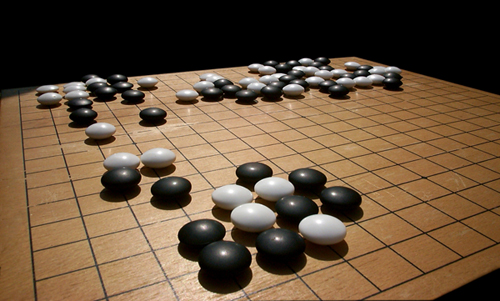Out on a Limb: 5 Close Games
A good friend recently pointed out that although the Go-playing artificial intelligence AlphaGo has now beaten world champion Lee Sedol at Go in both matches to date, the results have been very close. AlphaGo has only “just” won. As I write, it is Friday March the 11th, and results of the third match have yet to be announced.
Time to go out on a limb….
Go
Although I think AlphaGo has a very good chance of winning all five matches (I’ll say why in a second), it wouldn’t surprise me to see all of the matches being close (with the provisio that Sedol doesn’t have a complete, utter and very human meltdown).
The point to remember is that AlphaGo is a hybrid artificial intelligence that combines a deep neural network with additional tree-search algorithms. It learns by by actually playing games, adjusting its estimate of the likelihood of a given move advancing towards victory or defeat. During training, it played humans, other Go-playing software, and different versions of itself. (I have been unable to determine whether it was actually fed real-game histories as well.)
Sedol is widely recognized to be the best player in the world today (although in three more days, we may need to insert “human” as a qualifier to that accolade). So AlphaGo is unlikely to have been trained on many games where the quality of play exceeded what Sedol is typically capable of.
AlphaGo’s most basic strategy does not involve it becoming creative or inventive at the game. It simply recognises patterns in previous training sessions that tend to lead to success, and then applies them in live games. And up until now Lee Sedol has been the very best generator of such patterns. So it strikes me as unlikely that AlphaGo has evolved to be substantially better than Sedol.
But All Five Games?
So why do I think, nonetheless, that AlphaGo has a good chance of winning all five games?
First, although it is not immune to blunders, it is less likely to make them. It doesn’t know the importance of the match, it doesn’t feel stress, it cannot be psyched out. In contrast, Lee Sedol himself said he was “in shock” after his first defeat; he simply had not expected to lose. So having lost twice now, I expect he is under a lot of pressure: he needs to win three in a row to claim the $1 million prize.
But Sedol’s emotional reaction, his “shock” leads me to a much more human view of AlphaGo’s own chances. Before the match, many of Sedol’s followers were saying there is no chance he’d lose. What was this theory based on? Nothing really. Up until late 2015, no outsider had ever seen AlphaGo play. Then, many dismissed AlphaGo’s clean sweep of the European champion, Fan Hui, by pointing out that he was only a 2 dan level player. Sedol is a 9 dan, the top ranking. Was this good evidence upon which to base a prediction?
Go
I don’t think so. If I played Roger Federer at tennis right now (I am a terrible tennis player), he would certainly thrash me. Would you learn anything about just how good a tennis player he is from that? No. He wouldn’t even break into a sweat. So Sedol’s own confidence, and the confidence of his followers was based more on hubris than rational thought. A very human failing, that.
The Ghost in the Machine
But I said I wanted to take a more human view of AlphaGo’s own chances. You could argue that AlphaGo is a machine, and therefore being human doesn’t enter into it. Or does it? Best to remember that its minder is a human. So it is worthwhile talking about the two as a unit.
The minder is the ghost in the machine….
A few weeks before the match, Google DeepMind’s CEO, Demis Hassabis, said he thought AlphaGo had a 50:50 chance of winning the competition.
But was he being coy?
Would Hassabis have gone into such a high-profile competition thinking he had only a coin-flip’s chances of winning? I don’t think so. So perhaps that very same, very human, hubris had him really thinking his creation stood a better than 50:50 chance.
But I doubt even this.
The DeepMind team would be the only ones who really knew what AlphaGo was capable of. And they would have had a complete history of all Sedol’s significant games. So Hassabis, unlike Sedol, would have good evidence, going into the competition, who was likely to win.
So, did man/machine enter the competition with a coin-toss chance of winning? Did man/machine enter due to hubris? No.
They entered because they thought they would win.
Epilogue
In the end, AlphaGo beat Lee Sedol in 4 of the 5 games, Sedol winning the 4th. Demis Hassabis commented that in move 79 of game 4, AlphaGo made a poor choice, but took 8 moves to “discover” its mistake, at which time its estimated probability of winning the game fell dramatically.


